148 scholarly books by Karolinum Press and 10
have author last names that start with M
148 scholarly books by Karolinum Press and 10
148 scholarly books by Karolinum Press
10 have author last names that start with M have author last names that start with M
10 have author last names that start with M have author last names that start with M
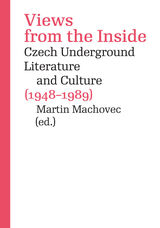
Views from the Inside
Czech Underground Literature and Culture (1948–1989)
Martin Machovec
Karolinum Press, 2019
From political novels to surrealist poetry and censored rock and roll, Czech underground culture of the later twentieth century displayed an astonishing, and unheralded, variety. This fascinating exploration of that underground movement—the historical, sociological, and psychological background that gave rise to it; the literature, music, and arts that comprised it; and its more recent incorporation into the mainstream—draws on the voices of scholars and critics who themselves played an integral role in generating it. Featuring the writings of Czech poet Ivan Martin Jirous, philosopher-poet Egon Bondy, and writer Jáchym Topol, as well as Canadian expat and translator Paul Wilson—many of which have never before been available in English—in addition to an expanded bibliography reflecting advances in scholarship, this second edition of Views from the Inside is both a work of literature and an eye-opening volume of criticism.
[more]
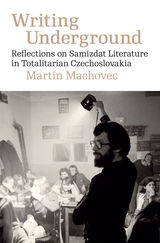
Writing Underground
Reflections on Samizdat Literature in Totalitarian Czechoslovakia
Martin Machovec
Karolinum Press, 2019
In this collection of writings produced between 2000 and 2018, the pioneering literary historian of the Czech underground, Martin Machovec, examines the multifarious nature of the underground phenomenon. After devoting considerable attention to the circle surrounding the band The Plastic People of the Universe and their manager, the poet Ivan M. Jirous, Machovec turns outward to examine the broader concept of the underground, comparing the Czech incarnation not only with the movements of its Central and Eastern European neighbors, but also with those in the world at large. In one essay, he reflects on the so-called Půlnoc Editions, which published illegal texts in the darkest days of the late forties and early fifties. In other essays, Machovec examines the relationship between illegal texts published at home (samizdat) and those smuggled out to be published abroad (tamizdat), as well as the range of literature that can be classified as samizdat, drawing attention to movements frequently overlooked by literary critics. In his final, previously unpublished essay, Machovec examines Jirous’s “Report on the Third Czech Musical Revival” not as a merely historical document, but as literature itself.
[more]
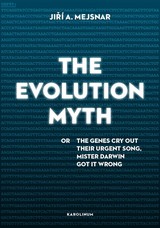
The Evolution Myth
or, The Genes Cry Out Their Urgent Song, Mister Darwin Got It Wrong
Jirí Mejsnar
Karolinum Press, 2014
The origins of life, species, and man continue to interest scientists and stir debate among the general public more than one hundred and fifty years after Charles Darwin published On the Origin of Species. The Evolution Myth approaches the subject with two intertwined objectives. Jirí A. Mejsnar first sets out to convey the advances made in cosmology, molecular biology, genetics, and other sciences that have enabled us to change our views on our origins and our relationship with the universe. Scientific advances now allow us to calculate, for example, the age of the universe, the period in which biblical Eve lived, and, with good justification, to reconsider the possibility that the Neanderthals and primates might be our ancestors.
The author’s second objective is to use biology to explain why evolution cannot have taken place in the way that is most commonly assumed. Mejsnar builds his case around gene stability and on the sophisticated modern techniques for gene manipulation, the complexity of which make these modified genes inaccessible to nature. Development of life on Earth is a discontinuous, saltatory progression that results in stages following from preceding latent periods in which new forms suddenly appear and possess new types of genome. This, the author argues, is difficult to reconcile with the hypothesis of continuous biological evolution based on the natural selection of random variations.
Taking a new approach to a much-debated subject, Mejsnar distills complex information into a readable style. The result is a book that is sure to get readers talking.
The author’s second objective is to use biology to explain why evolution cannot have taken place in the way that is most commonly assumed. Mejsnar builds his case around gene stability and on the sophisticated modern techniques for gene manipulation, the complexity of which make these modified genes inaccessible to nature. Development of life on Earth is a discontinuous, saltatory progression that results in stages following from preceding latent periods in which new forms suddenly appear and possess new types of genome. This, the author argues, is difficult to reconcile with the hypothesis of continuous biological evolution based on the natural selection of random variations.
Taking a new approach to a much-debated subject, Mejsnar distills complex information into a readable style. The result is a book that is sure to get readers talking.
[more]
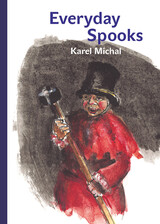
Everyday Spooks
Karel Michal
Karolinum Press, 2008
Prague-born Karel Michal (1932–84) lived a significant part of his adult life under Czechoslovakia’s oppressive communist regime. Prevented from studying at the university as a young man, he fruitlessly cycled through a number of professions before finally turning to writing in the early 1960s. Michal’s works—which include detective fiction, historical novels, short stories, and screenplays—offer a Kafkaesque perspective on the mechanism of the absurd and argue for substantial reinterpretation of the concept of ordinary life under a totalitarian regime.
With Everyday Spooks, Michal presents an unforgettable assortment of fantastic creatures that inhabit his strange vision of everyday reality in ’50s and ’60s communist Czechoslovakia. Translated from the Czech by David Short and complemented with suitably eerie illustrations by Dagmar Hamsíková, this collection of seven short stories describes bizarre encounters where the past melts into the present, ordinary people meet comic and anxious figures and interact with ghosts, and mundane speech drifts repeatedly into absurdity.
[more]
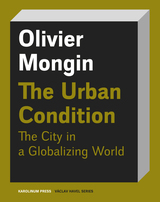
The Urban Condition
Olivier Mongin
Karolinum Press, 2016
The first installment in Karolinum’s new Václav Havel Series—which aims to continue the philosophical discourse of that thinker, playwright, dissident, and president—this book asks whether it will be possible to reestablish urban spaces that are in tune with our times. By recalling the distinctive elements that comprise the urban experience, Olivier Mongin lays the basis for reflection on the contemporary urban condition. We live in an epoch in which information exchange takes place according to flows rather than in locations, in which globalization has thrust us into a post-city, post-urban world.
In the past, we were accustomed to seeing the city as a circumscribed space, the setting for cultural, social, and political life that enabled the civic integration of individuals. Now we find ourselves confronted by both seemingly limitless, gigantic megalopolises and the emergence of global networks of entities cut off from a physical environment. The current reconfiguration is cause for concern: Are we witnessing the terminal decline of the urban values that have been a concomitant part of recent human history? Will fragmentation and chaotic urban sprawl inevitably prevail? Are we doomed to lament the lost legacies of the Greek polis, the Renaissance city, Enlightenment Paris, and the great industrial cities of the nineteenth century?
In the past, we were accustomed to seeing the city as a circumscribed space, the setting for cultural, social, and political life that enabled the civic integration of individuals. Now we find ourselves confronted by both seemingly limitless, gigantic megalopolises and the emergence of global networks of entities cut off from a physical environment. The current reconfiguration is cause for concern: Are we witnessing the terminal decline of the urban values that have been a concomitant part of recent human history? Will fragmentation and chaotic urban sprawl inevitably prevail? Are we doomed to lament the lost legacies of the Greek polis, the Renaissance city, Enlightenment Paris, and the great industrial cities of the nineteenth century?
[more]
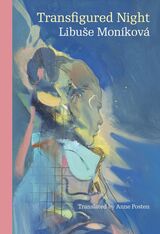
Transfigured Night
Libuše Moníková
Karolinum Press, 2023
A vision of late-twentieth-century Prague from an acclaimed Czech novelist.
In late 1992, three years after the Velvet Revolution and as Czechoslovakia is about to dissolve into the Czech Republic and Slovakia, choreographer and dancer Leonora Marty, who fled the Communist state decades earlier, has returned to Prague. Having wrapped up her ballet of The Makropulos Affair, the famous dancer meets old classmates, wanders the city through crowds of tourists, and visits the most obscure and unvisited museums. When she is approached by Thomas Asperger, a descendant of ethnic Germans driven from Czechoslovakia after World War II, she must confront three relationships—her relationship with the city of her youth, her homeland’s relationship with its past, and her new romance with this German admirer.
Written in German and published in 1995, by an author whose life mirrored her protagonist’s, the novel provides a cultural tour of Prague. Employing a style as influenced by the operas of Leoš Janácek as the novels of Thomas Pynchon, Transfigured Night is a masterpiece of Czech literature, showing that the culture of this nation comes in a variety of tongues.
In late 1992, three years after the Velvet Revolution and as Czechoslovakia is about to dissolve into the Czech Republic and Slovakia, choreographer and dancer Leonora Marty, who fled the Communist state decades earlier, has returned to Prague. Having wrapped up her ballet of The Makropulos Affair, the famous dancer meets old classmates, wanders the city through crowds of tourists, and visits the most obscure and unvisited museums. When she is approached by Thomas Asperger, a descendant of ethnic Germans driven from Czechoslovakia after World War II, she must confront three relationships—her relationship with the city of her youth, her homeland’s relationship with its past, and her new romance with this German admirer.
Written in German and published in 1995, by an author whose life mirrored her protagonist’s, the novel provides a cultural tour of Prague. Employing a style as influenced by the operas of Leoš Janácek as the novels of Thomas Pynchon, Transfigured Night is a masterpiece of Czech literature, showing that the culture of this nation comes in a variety of tongues.
[more]
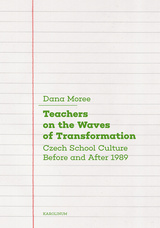
Teachers on the Waves of Transformation
School Culture Before and After 1989
Dana Moree
Karolinum Press, 2020
It is known that a society in transformation undergoes significant changes on many levels, but structural and cultural changes are arguably two of the most significant. How do such monumental changes affect the lives of individuals and small communities?
Teachers on the Waves of Transformation aims to answer this question through the lens of education. With careful exploratory research at two schools in a small town in central Bohemia, anthropologist Dana Moree follows the fates of two generations of teachers at the schools. Through interviews with teachers, school administrators, and the students’ parents, Moree focuses on the relationships, values, shared stories, and symbolic and ritual worlds that create the culture of the schools. Teachers on the Waves of Transformation offers a unique perspective of cultural flux as witnessed in the classroom.
Teachers on the Waves of Transformation aims to answer this question through the lens of education. With careful exploratory research at two schools in a small town in central Bohemia, anthropologist Dana Moree follows the fates of two generations of teachers at the schools. Through interviews with teachers, school administrators, and the students’ parents, Moree focuses on the relationships, values, shared stories, and symbolic and ritual worlds that create the culture of the schools. Teachers on the Waves of Transformation offers a unique perspective of cultural flux as witnessed in the classroom.
[more]
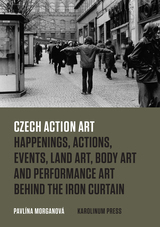
Czech Action Art
Happenings, Actions, Events, Land Art, Body Art and Performance Art Behind the Iron Curtain
Pavlína Morganová
Karolinum Press, 2014
Czech action art—a medium similar to performance art that does not require an audience—emerged out of the political and social turmoil of the 1960s. This movement has received little critical attention, however, as the Iron Curtain prevented its dissemination to an international audience. Here theorist and art historian Pavlína Morganová gives this art scene its due, chronicling its inception and tracing its evolution through to the present.
Morganová explains the various forms of action art, from the “actions” and “happenings” of the 1960s; to the actions of land art that encompass stones, trees, water, or fire; to recent displays of body art; to the actions of the latest generation of artists, who are using the principles of action art in contemporary postconceptual and participative art. Along the way, she introduces the most prominent Czech artists of each specific niche, including Milan Knížák, Zorka Ságlová, Ivan Kafka, Petr Štembera, Karel Miler, Jirí Kovanda, and Katerina Šedá, and demonstrates not only the changes in the art forms themselves but also the shifting roles of artists and spectators after World War II.
With over one hundred illustrations, Czech Action Art introduces this heretofore overlooked but fascinating art form to a global readership.
Morganová explains the various forms of action art, from the “actions” and “happenings” of the 1960s; to the actions of land art that encompass stones, trees, water, or fire; to recent displays of body art; to the actions of the latest generation of artists, who are using the principles of action art in contemporary postconceptual and participative art. Along the way, she introduces the most prominent Czech artists of each specific niche, including Milan Knížák, Zorka Ságlová, Ivan Kafka, Petr Štembera, Karel Miler, Jirí Kovanda, and Katerina Šedá, and demonstrates not only the changes in the art forms themselves but also the shifting roles of artists and spectators after World War II.
With over one hundred illustrations, Czech Action Art introduces this heretofore overlooked but fascinating art form to a global readership.
[more]
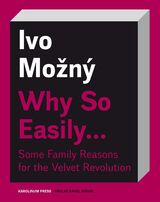
Why So Easily . . . Some Family Reasons for the Velvet Revolution
A Sociological Essay
Ivo Možný
Karolinum Press, 2023
A famed essay examines the Velvet Revolution from a sociological perspective.
Thirty-two years after its initial publication, this respected sociological essay, written in the history-making years of 1989 and 1990, is available for the first time in English. The essay tells the story of a despotic Socialist state expropriating the family (and with it the private sphere of life) only to be colonized by the very thing it expropriated forty years later. The essay plunges the reader into the pivotal time of the Velvet Revolution and provides valid explanations for the grassroots causes of the old regime’s downfall, examining the private aspirations and strategies of highly disparate groups of nameless social actors of the old regime that eventually sapped almost everyone of any interest in keeping the regime afloat.
Thirty-two years after its initial publication, this respected sociological essay, written in the history-making years of 1989 and 1990, is available for the first time in English. The essay tells the story of a despotic Socialist state expropriating the family (and with it the private sphere of life) only to be colonized by the very thing it expropriated forty years later. The essay plunges the reader into the pivotal time of the Velvet Revolution and provides valid explanations for the grassroots causes of the old regime’s downfall, examining the private aspirations and strategies of highly disparate groups of nameless social actors of the old regime that eventually sapped almost everyone of any interest in keeping the regime afloat.
[more]
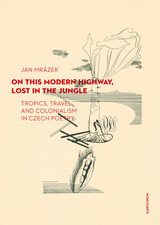
On This Modern Highway, Lost in the Jungle
Tropics, Travel, and Colonialism in Czech Poetry
Jan Mrázek
Karolinum Press, 2022
Postcolonial reflections on Indonesia’s influence upon the avant-garde poetry of a non-colonial European.
In 1926, the Communist avant-garde poet Konstantin Biebl (1898–1951) traveled from Czechoslovakia to the Dutch East Indies. In the writings from his journal—texts simultaneously poetic and comic—both landlocked Bohemia and the colonized tropical islands are seen in disorienting new perspectives, like “mirrors looking at themselves in each other.”
Jan Mrázek’s On This Modern Highway, Lost in the Jungle takes us on a journey of our own, crisscrossing Biebl’s life and work—with particular attention to his travel writing—as they mirror Mrázek’s own experiences as a multinational academic: a Prague conservatory graduate, educated at Michigan and Cornell, and now a scholar of Indonesia living in Singapore. Biebl’s writings are also the book’s point of departure for a broader exploration of the intersections of travel and poetry, issues of colonial and social injustice, and the representation of otherness in the Czech literary and visual imagination. In its attention to how poetic travel reflects the Czech historical experience in the shadow of imperial nations, Mrázek’s book elevates scholarly reflection on literary travel, modernity, and colonialism to a new level.
In 1926, the Communist avant-garde poet Konstantin Biebl (1898–1951) traveled from Czechoslovakia to the Dutch East Indies. In the writings from his journal—texts simultaneously poetic and comic—both landlocked Bohemia and the colonized tropical islands are seen in disorienting new perspectives, like “mirrors looking at themselves in each other.”
Jan Mrázek’s On This Modern Highway, Lost in the Jungle takes us on a journey of our own, crisscrossing Biebl’s life and work—with particular attention to his travel writing—as they mirror Mrázek’s own experiences as a multinational academic: a Prague conservatory graduate, educated at Michigan and Cornell, and now a scholar of Indonesia living in Singapore. Biebl’s writings are also the book’s point of departure for a broader exploration of the intersections of travel and poetry, issues of colonial and social injustice, and the representation of otherness in the Czech literary and visual imagination. In its attention to how poetic travel reflects the Czech historical experience in the shadow of imperial nations, Mrázek’s book elevates scholarly reflection on literary travel, modernity, and colonialism to a new level.
[more]
READERS
Browse our collection.
PUBLISHERS
See BiblioVault's publisher services.
STUDENT SERVICES
Files for college accessibility offices.
UChicago Accessibility Resources
home | accessibility | search | about | contact us
BiblioVault ® 2001 - 2024
The University of Chicago Press









